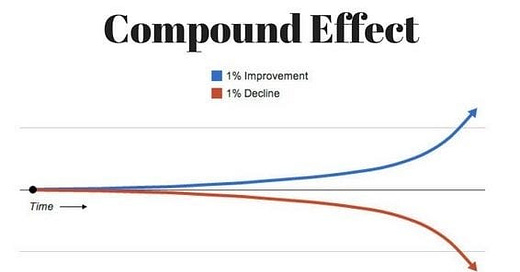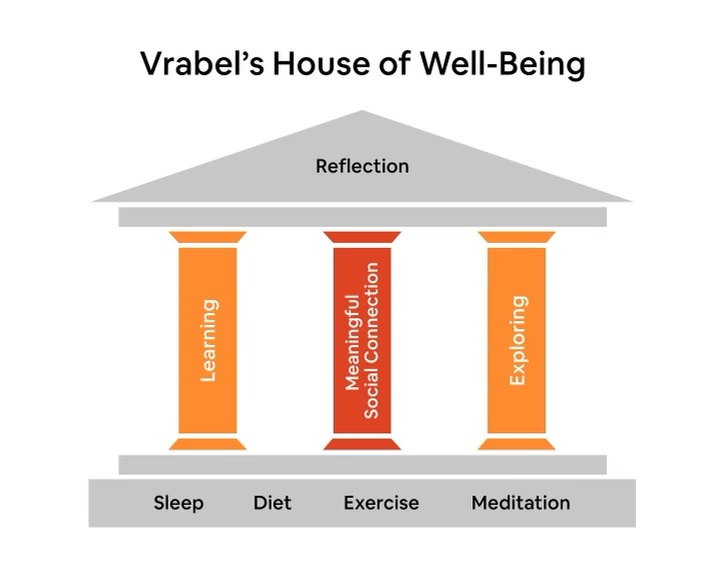If you want to run a marathon, put your shoes by the door. If you want to write a book, start with a paragraph. If you want to lose 25 pounds, replace soda with water. When setting big goals, you don’t need to tackle them immediately. In fact, if they are challenging enough, you likely won’t. Rome wasn’t built in a day and nothing worth having comes easy. It’s in the little moments where big results are built. Stack good habits and you’ll achieve good outcomes. Stack bad habits and your growth will go the other direction. As James Clear talks about, “atomic habits” are the little things that we do each day to grow into better versions of ourselves and ultimately promote long term progress; it’s all about the little things.
As we think about the person that we want to become, the systems/processes that you have in place for yourself are more important than the goals/outcomes. If you have bad systems, you can still achieve good outcomes by luck or circumstance, which can reinforce bad habits. For example, poor leaders who become “successful” in their chosen field despite belittling their employees, being overly arrogant, and failing to properly train people below them. Luck or other circumstances can happen and they can certainly still go on to be “successful” in future endeavors. These same poor leaders will cite these traits as reasons they were successful. It’s a helpful reminder that you can achieve positive outcomes IN SPITE of those things, not as a result of them. Distinguishing between correlation and causation in anything is important. On the more positive side of the coin, over time, good systems/processes/habits result in consistent positive progress. It doesn’t mean the journey will be linear, but the trendline will be up and to the right.
Environment is so important for the formation of habits. Who/what you are surrounded by will play a large role in the habits you form. Find and seek out cultures with a shared identity where your desired behavior is the norm. As humans, we crave a sense of belonging and often imitate the habit of 3 groups: the close (who we are surrounded by), the many (who we perceive as popular), and the powerful (who we perceive as successful). While this can be helpful and inspiring in some instances, it can also be dangerous and lead to bad habits. Be mindful of who is inspiring your habits; you will emulate them more than you think.
Commitment devices are useful in building new habits. According to Katy Milkman, in her book How to Change: The Science of Getting from Where You Are to Where You Want to Be, there are two types of commitment devices that can be helpful to build better habits and promote behavioral change:
Hard commitments- assigning a monetary value to a behavior/action. As a real-life example, I had a problem where I would pick my fingernails for over a decade. Not sure if it was a nervous habit or what, but I wanted to quit. I opted to charge myself $100 if I picked my nails and would have to donate to charity. Of course it takes self-discipline to adhere to this, but I haven’t done it since fall of 2021.
Soft commitments- using trust and reputation to guide behaviors/actions. As another real life example, I told my mom that I was going to charge myself $100 for every time I picked my fingernails. Now, if I do that, I not only owe $100, but I’ve evaded her trust because she is keeping my accountable. These two mechanisms in tandem are powerful ways of adding / eliminating good / bad habits and promoting behavioral change.
A few reflection questions as it pertains to our actions, habits and forming routines to promote our own versions of excellence:
Who are you striving to become?
Do your habits cast a vote for the person described above? If not, what type of person do your habits present you as?
How does your environment/the people you surround yourself by influence your habits and the type of person you are developing into? Positive or negative impacts?
Who are the people in your life that make you better? Who are the ones that challenge you to grow into a better person? Can you enlist these people as accountability partners and have more targeted conversations around growth, knowing that you will make each other better?
What is one habit that you can install TODAY to nudge you closer to the person that you want to become? What is one habit that you can get rid of TODAY to nudge you closer to the person that you want to become?
The compound effect works in both directions. If you can work on the atomic level of habits, and become 1% better each day, through compound interest you’ll become 37x better each year. Conversely, if you become 1% worse each day, you’ll become 37x worse each year. Little things add up to big results. You choose the direction.
Mental Diet
📚What I’m Reading: Four Thousand Weeks by Oliver Burkeman
Quote of the Week:
“Your actions reveal how badly you want something. If you keep saying something is a priority but you never act on it, then you don’t really want it. It’s time to have an honest conversation with yourself. Your actions reveal your true motivations.” - James Clear
I hope you enjoyed reading as much as I enjoyed writing. If you are enjoying The Weekly Spark, please share with a friend, family member, or coworker who you think might benefit. If you have thoughts, comments, or feedback, please reply to this email and share them; I’d love to hear from you! Until next time… Take care of yourself and take care of each other. 🙏
Nathan







This is very enlightening Nathan! Thank you for shining the light of awareness on our collective habits 🌞 keep up the amazing work and systems you have built brother❤️🔥